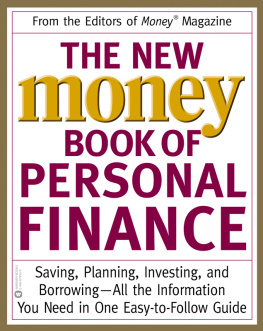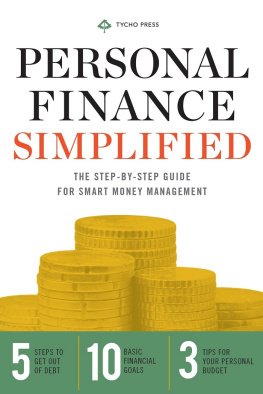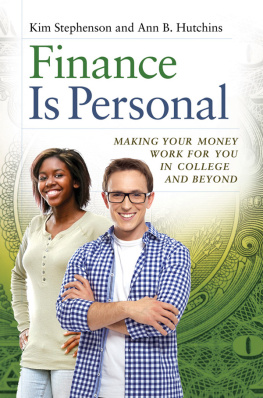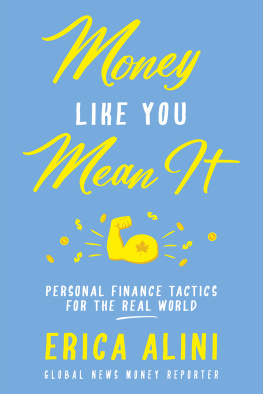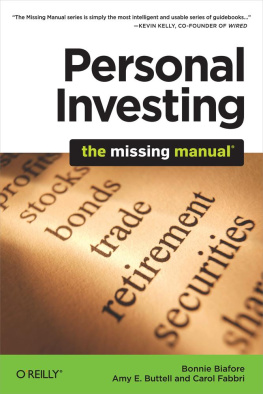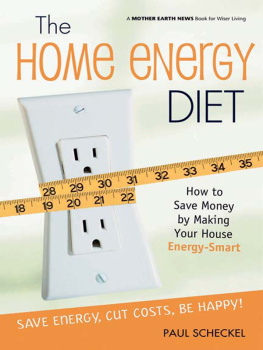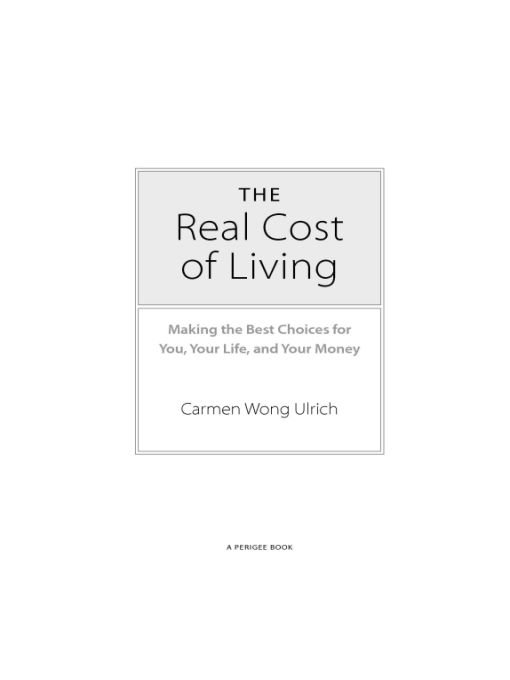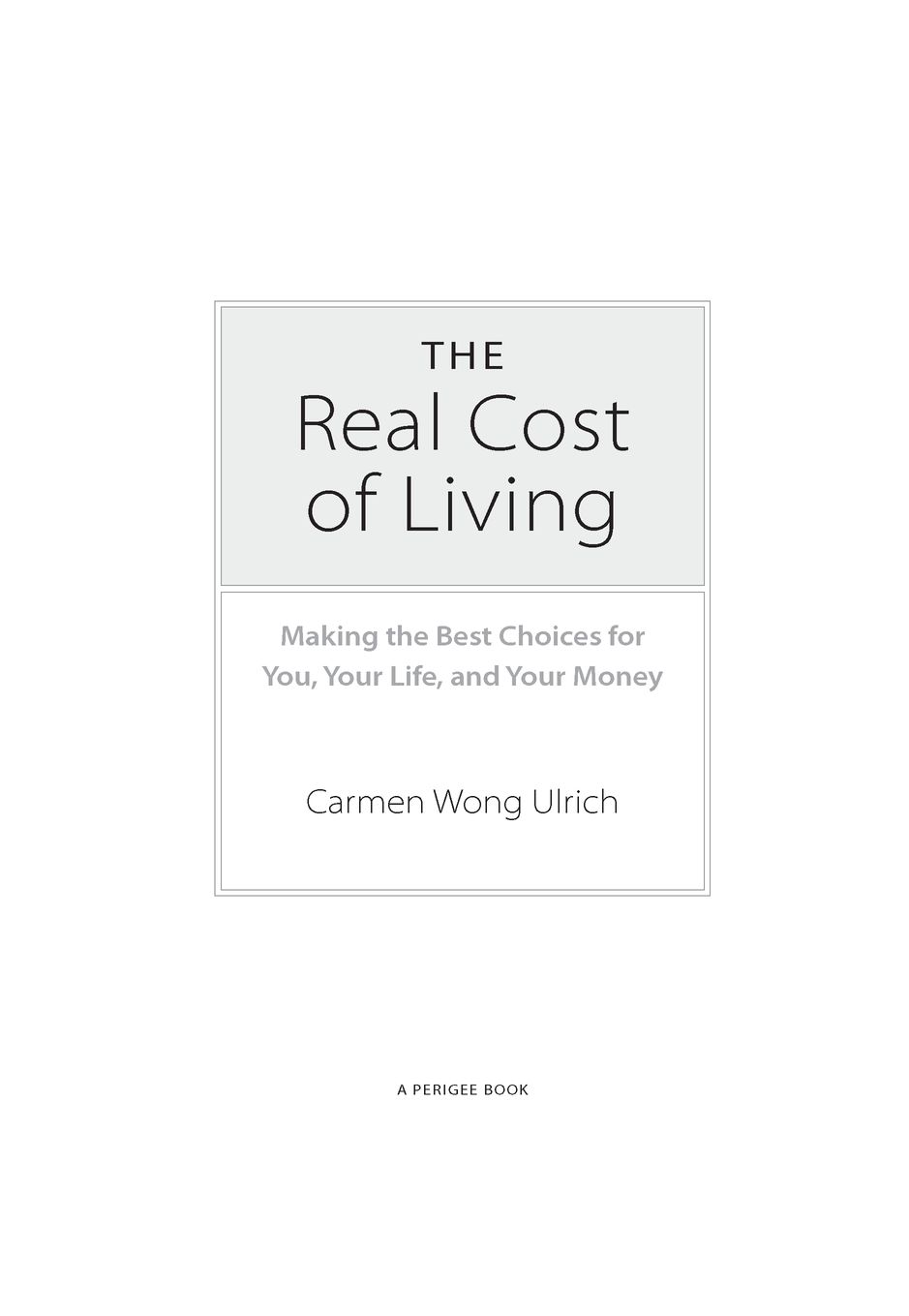Table of Contents
PRAISE FOR
The Real Cost of Living
From homeownership to relationships to parenthood, Carmen knows that money is about so much more than numbers. This book will help you make real-world financial decisionsand improve your life.
Kimberly Palmer, author of Generation Earn and personal finance columnist at U.S. News & World Report
The Real Cost of Living is a great framework for telling the story of money. Carmen combines her knack for getting to the heart of the matter with the butt-kicking spirit of a personal trainer. Readers will get their financial lives in shape.
Bob Sullivan, writer of MSNBC.coms Red Tape Chronicles and author of the New York Times bestsellers Gotcha Capitalism and Stop Getting Ripped Off
Most financial planning books promise big returns without mentioning risk. Carmen Wong Ulrich takes a more usefuland practicalapproach by discussing costs. She understands lower costs correlate with higher returns. I highly recommend her book.
Daniel R. Solin, author of the bestselling The Smartest Investment Book Youll Ever Read, The Smartest 401(k) Book Youll Ever Read, and The Smartest Retirement Book Youll Ever Read
This book is a tool that we all should use as we build a better life.
Joi Gordon, CEO of Dress for Success Worldwide
The Real Cost of Living is a must-read for everyone of every age. Because of Carmens training in psychology and her varied life experiences, she sees the world of personal finance through an entirely unique lens. This is no ordinary money book. Carmen invites the reader to examine and reflect on why we make the choices we do as we explore how each choice has a personal as well as a financial cost and reward. As she deftly points out, everything has a cost attached to it; things we think about and things we never thought we had to think about are discussed from the perspective of choice. Ms. Wong Ulrich explains the real cost of living with depth and humor, peppered with superb relatable examples. This is a handbook to help us make important life choices so we can be aware of living our lives consciously, realistically, and responsibly.
Dale V. Atkins, PhD, psychologist, relationship expert, and author of Sanity Savers
PRAISE FOR CARMEN WONG ULRICH
Ulrichs advice is simple and to the point ... (She) does argue for some big nationwide initiatives, like a higher minimum wage and increased credit card regulation, but shes much more concerned with providing basic solutions to individual financial crisesand delivers the goods effectively.
Publishers Weekly
Rich with commonsense insights and easy-to-implement plans ... Generation Debt brings a critically important topic to life in a helpful, fun package.
Robert Safian, editor in chief of Fast Company magazine
For Bianca, who is priceless.
INTRODUCTION
We had just gotten back from a rainy run to our local Target, toddler in tow. Bad traffic, chilly wet weather, and a grumpy two-year-old had us happy to hoist our haul back home and settle in for the remainder of the afternoon.
Oh, man! Its ripped! My husband let flow his outrage at our brand-new, out-of-package, torn mattress cover. Thats it, he grumbled as he rolled it back up. Im going back.
In that mess?! Itll take two hours there and back, not to mention the lines. I saw no reason to renew a rendezvous with rain, traffic, and customer service for a $7.99 mattress cover.
I managed to talk him out of heading back into a hostile Sunday afternoon at the shopping center but only after I expressed why I thought his time may be better spent with us. He felt that it was worthwhile to go back because of the principle of the matter, not the money. We were sold a bad piece of merchandisea manufacturing accident, surelyand he wanted the vendor to know. It was good customer service. I, on the other hand, felt that it was all about how much our time was worthat that point, a lot more than $7.99. Instead of him traveling back to the store, he could watch the baby so I could get dinner started. We could then enjoy dinner at a regular hour, keeping the baby on the schedule that seemed to make her happy and then bedtime at a good hour would ensue. Time lost to getting that $7.99 back (or a new, functioning mattress cover) was a domino effect to me: lost time, lost money, lost nerves due to a baby thrown off schedule. Granted, its a privilege that we had a choice: the $7.99 or the two hours. But it was a choice nonetheless. Only one choice of dozens that we make on a weekly basis that sometimes have to do with money but sometimes have less to do with money than with what we want: happiness, security, peace in the house. Because my degrees are not in finance but in psychology, and my experience and training is in journalism, throughout my career in personal finance I have seen and continue to see money differently from those trained in the more technical side of the profession. On the personal finance show I hosted and coproduced for CNBC for a year, On the Money, I was able to not only report and research personal finance but to interact with you, viewers and readers, at a level few journalists experience. Through the show, as well as on Facebook and Twitter, Id communicate with as many people as possible to not only help with money questions and conundrums but to learn more about what was vexing you about financial decisionsand lifein general (it was the best part of my job). This happened at a heady timethe Great Recession that began in 2008. A time when help, knowledge, and guidance about money was needed more than ever. But I noticed that what was needed just as much as facts, websites, and strategy was understanding.
I saw the psychological costs of financial decisions take their toll growing up. I know how defeating it can feel to not be able to get out of debt. And we all know how important insurance and a will are, but sometimes we just put these things off. Why? Because what we do with money sometimes isnt about money. Economics has finally recognized that we are not rational creatures; were not all about the accounting. Behavioral economics, the study of the neuropsychology behind how we behave with our money, has won Nobel Prizes. But its also timeespecially for those of us in personal financeto realize that there is a lot more going on than money when it comes to making decisions about our money and our lives.
On the show, sometimes a panel of financial planners would come on to take callers questions with me. Once in a while, Id be amazed at how one would pontificate on why he was right (they were mostly hes) and off camera, how stupid people could be, when it wasnt stupidity guiding the callers decision but a personal need. Of course, when I disagreed with these planners, I let them and everyone watching know, but there were few times when a planner would realize why the caller or guest was just not getting it: because the planner wasnt listening to why the viewers were doing what they were doing. Why does this caller insist on prepaying her mortgage? Because she saw her mother lose her home to the bank and she doesnt ever want that to happen to her. Why does this couple think its okay to have such a big, expensive car? Because they grew up poor, work too hard, dont have time to enjoy the results, and the car is not only a symbol of what theyre working toward but something they can take pleasure in day in and day out. (I still told that couple to get rid of the car, but they were receptive to that advice only after I listened to them talk about what the car symbolized and acknowledged their motivation.) Why does this man want to use up his life savings to pay for his sons college tuition? Because education is his American Dream, and he knows that his son will care for him in his old age. Why does this woman smoke two packs a day when she can barely pay her bills? Because shes hooked and needs help.


